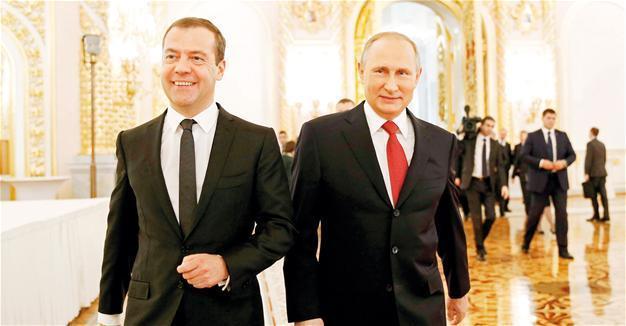Turkey’s ‘dollar-exit’ trade plan to be tested in PM’s Russia visit
Sevil Erkuş - ANKARA

Prime Minister Binali Yıldırım will visit Russia on Dec. 5-7, where he will discuss Ankara’s first steps to ensure that trade with China, Russia and Iran is conducted in local currency, along with several other key issues.
All accommodation expenses and other expenditures by the Turkish delegation will be paid for in Russian rubles, the Prime Ministry said in a statement yesterday.
President Recep Tayyip Erdoğan said on Dec. 3 Ankara was seeking to conduct its trade with Russia, China and Iran in local currencies.
“I suggested the following: Let’s conduct our trade in local currencies. Whatever I buy [from you] I will pay for in Russian rubles, and whatever you buy from me, you will pay for in Turkish Liras,” said Erdoğan, adding that he had already made the same offer to China and Iran.
Economy dominates agenda in talksYıldırım is paying a visit to Russia in the aftermath of a bilateral crisis with Moscow after Turkey shot down a Russian warplane on Nov. 24, 2015, due to an alleged airspace violation.
Following a nine-month strain in ties, Ankara and Moscow restored relations on political, economic, security and energy areas, with the Turkish prime minister’s visit aiming to lay the ground for the next meeting of the High-Level Russian-Turkish Cooperation Council in 2017.
Erdoğan visited Saint Petersburg on Aug. 9 in his first direct meeting with Russian counterpart Vladimir Putin since the jet incident.
Yıldırım will meet Putin, Prime Minister Dmitry Medvedev and Federation Council Speaker Valentina Matviyenko and deliver a speech at the Moscow State Institute of International Relations.
Economic issues will dominate the agenda of talks in Moscow, including a discount in the price of natural gas imported by Turkey, the use of local currency in trade, the prohibition of exports of Turkish agricultural products to Russia, visa immunity, the Turkish Stream pipeline project and tourism.
Russia has been lifting sanctions on Turkey that were imposed after the jet crisis, but Moscow has only been taking gradual steps. However, Ankara has asked Moscow to accelerate the normalization of economic ties, particularly visa-free travel for tourists and businessmen.
Prior to the downing of the Russian Sukhoi Su-24 warplane, citizens of the two countries were able to travel between Turkey and Russia without requiring visas.
However, Moscow is worried that visa-free travel could result in potential militants traveling to Russia.
After his meeting with Turkish Foreign Minister Mevlüt Çavuşoğlu last week in Alanya, Russian Foreign Minister Sergei Lavrov said that before lifting visa requirements, the mobility of people connected to terrorist activities should be prevented, adding that security institutions and consulates would cooperate to that end.
Lavrov also called on Turkish exporters to increase health standards on agricultural products, particularly meat products.
Russia has lifted bans on nine out of 21 Turkish agricultural products as of Oct. 9.
On Oct. 10, Turkey and Russia signed the strategic Turkish Stream gas pipeline agreement; Ankara expects a discount on natural gas in return.
 Prime Minister Binali Yıldırım will visit Russia on Dec. 5-7, where he will discuss Ankara’s first steps to ensure that trade with China, Russia and Iran is conducted in local currency, along with several other key issues.
Prime Minister Binali Yıldırım will visit Russia on Dec. 5-7, where he will discuss Ankara’s first steps to ensure that trade with China, Russia and Iran is conducted in local currency, along with several other key issues.